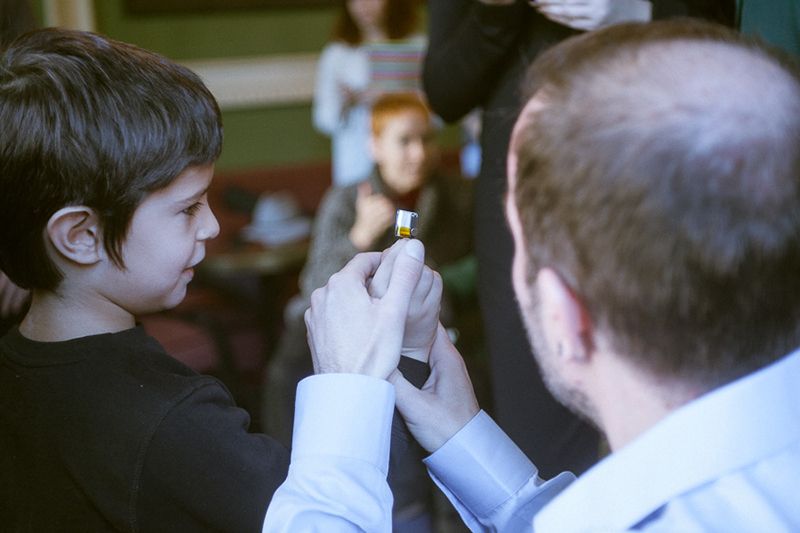This Artificial Sixth Sense Helps Humans Orient Themselves in the World
A London-based company is selling North Sense, a body-anchored device that vibrates when it faces magnetic north
/https://tf-cmsv2-smithsonianmag-media.s3.amazonaws.com/filer/34/68/34687dc5-1fec-4b19-a4b5-21f680bea3cf/north_sense.jpg)
A sense of orientation is a useful asset for a living thing. Many creatures appear to tap into the Earth´s magnetic field to locate themselves within, and move around, the planet. Sea turtles, pigeons, dolphins, migrating birds and even dogs—who show a preference for a North-South alignment when they excrete—all seem to be equipped with such a sense.
Some scientists, such as Joseph Kirschvink, a geophysicist at Caltech, suggest that humans also have a sense of the planet’s magnetic field, or magnetoreception, and are researching how it may function. Whether we have (or once had) a natural magnetic sense remains subject to debate. However, Cyborg Nest, a London-based company of transhumanists, is making an artificial one available to us now.
The company’s new sense, North Sense, is a miniature, standalone technology that vibrates when it faces magnetic north. It is permanently connected to the body via connectors and piercings, meaning the vibration is felt internally.
North Sense gives humans an embedded sense of orientation, but the team believes it will also impact on our cognitive experiences, including memory. Liviu Babitz and Scott Cohen of Cyborg Nest had their own North Senses fitted last month. In doing so, they became the first humans to possess the artificial sense.
"The feeling is internal. The vibration is not a violent thing—it creates kind of a buzz," says Babitz, leaning into his web cam to show me his North Sense as we talk via Skype. It is discreet at around a square inch in size, enclosed in body-compatible silicone and anchored onto his chest via titanium piercings.

North Sense is designed to be as natural as possible, says Babitz. “The idea was to try to create and imitate an organ, and not a piece of technology,” It contains a compass chip of the same type that you could find in your phone he explains, then quickly pre-empts the obvious question: why wouldn´t we just use our phones to find north?
“North Sense is a sense not a tool,” he says. It is not designed to be taken out, used and then put back. “A sense is something that gives you a constant and permanent flow of data, regardless if you want it or do not want it.” True, we don’t leave our eyes, ears or nose at home when we go out, and we can´t turn them on and off.
Babitz also points out that unlike many phones, North Sense does not have tracking abilities. “It’s not connected to any network, it doesn’t have any GPS, it doesn’t store any data about you,” he says.
Issues of personal security are of concern to Babitz. Prior to becoming CEO of Cyborg Nest, he was Chief Operating Officer of Videre, an organization that trains and coordinates activists who use undercover technology to expose human rights violations in hard-to-access communities.
The team at Cyborg Nest is full of technology pioneers. Alongside Babitz and Cohen, advisors of the year-old company include Neil Harbisson, an artist who perceives color as vibrations in his skull via an internet enabled ‘eyeborg;’ Moon Ribas, who has implants in her arms that allow her to feel the Earth´s seismic activity; and Steve Haworth, creator of subdermal and transdermal implants.
“We are all people driven by positivity, curiosity, daring and deep commitment to what we do,” says Babitz.
The group formed Cyborg Nest with the explicit aim of helping humans to expand their perception of reality using artificial senses. The choice to launch with a North Sense was an easy one, says Babitz. “The notion of north is deeply rooted in our traditions, history and many other animals share this as well.”

Precisely how many senses humans possess is a slippery question, but five are generally agreed upon: sight, smell, touch, hearing and taste. All contribute to how we experience, and remember, events and places. North Sense adds orientation and mapping to cognition. Since having his fitted, Babitz says, “There is no space that I have been to that I don't remember exactly the orientation of that specific space.”
By making North Sense available to buy online (for $350 until January 30, then $419), Cyborg Nest put an artificial sense into the public realm for the first time. The North Sense, the piercings, the connectors and a charging cable are bought as a package. You then take it to a body piercer for fitting.
But Babitz is adamant that they are not just "a shop for senses." He believes that North Sense will improve our understanding of our environment by linking us to Earth’s magnetic field. “Connecting to nature, we believe, will have a positive impact on society and on the world,” he says.
Michael Wheeler, a philosopher at the University of Stirling in the UK, studies cognition and the mind. He is not involved in the project, but thinks that North Sense is an exciting development. It marks a point where humans move from creating substitute senses, where technology is used to compensate for sense deprivation, to creating new senses that offer new kinds of experiences, he says.
To Wheeler, it is significant that Cyborg Nest intends North Sense to be on all the time and integrated into ordinary activity in a way that allows us to “perceptually experience the world in a different way.” If this proves to be the case, then it satisfies a condition for becoming part of our sensory system, he says, when “we don’t experience it, we experience the world through it.”
As to whether to North Sense will catch on, Wheeler is more skeptical. He can see niche applications, perhaps for artists or hikers. As to the wider public, if the experience itself is “amazing” or if it does prove to be useful for tracking memories, then he could see a future. Either way, there is “clearly a very good bit of psychology to be done just tracking how people react to it,” he says.
Keen to tap into that opportunity, Cyborg Nest will work with the Learning Technology Research Centre (LTRC) at Ravensbourne in London to study how North Sense impacts the lives of those who have it fitted. Carl Smith, director of LTRC, is currently developing the research— participation will be optional.
“We´re going to look at a range of questions to elicit as much detail about how these people are being affected by the North Sense, and whether it’s affecting their dream life, whether it’s affecting their social lives, whether it’s affecting their professional lives,” he says.
Smith views North Sense as boundary breaking but also refreshingly human-centric. It is a “super sense,” he says, because—as he expects the research will show—it will impact on all the other senses, as well as on memory and cognition.
The possibilities fascinate him. “I think it’s absolutely your birth right to be able to change your perception, much like you change the channels on your television,” he says.
Whether North Sense proves to have popular appeal or not, it is bound to inform future technological developments around sense, perception and reality. As the first artificial sense, it marks a milestone in our trajectory as a species.
Babitz is savoring being one of the first humans to posses it.
“The most fascinating parts are the parts where I forget about it,” he says. “I'm a father, I have a life, I have a family, so sometimes I do other stuff and then suddenly, oh! Ooh!” His North Sense kicks in.